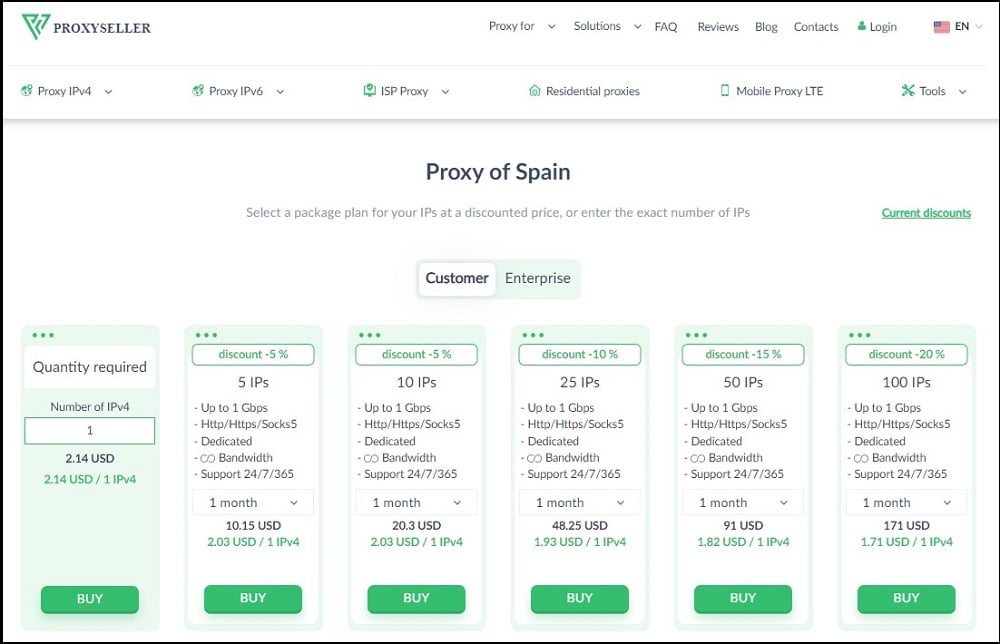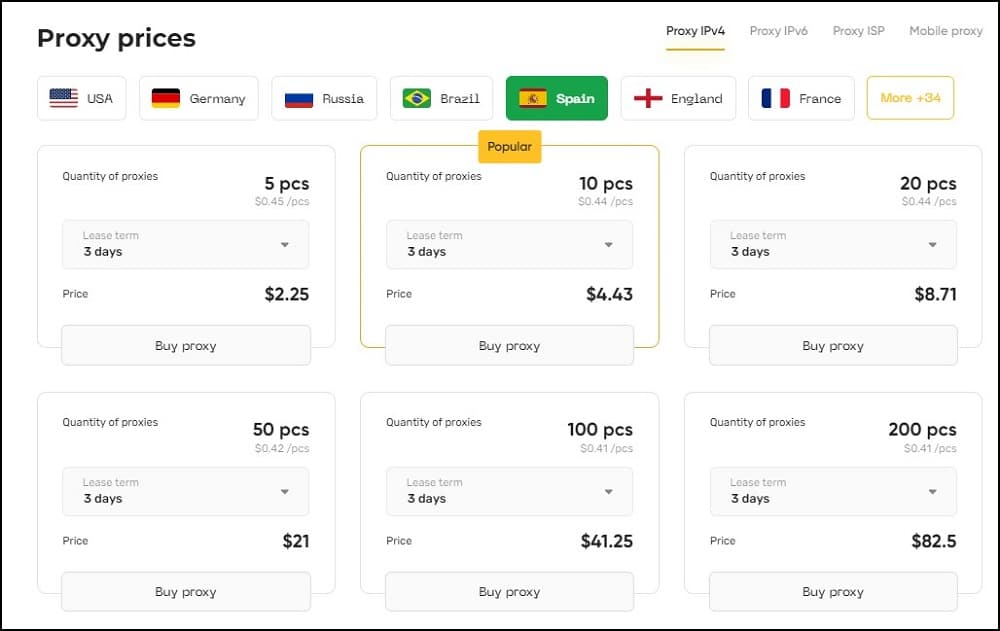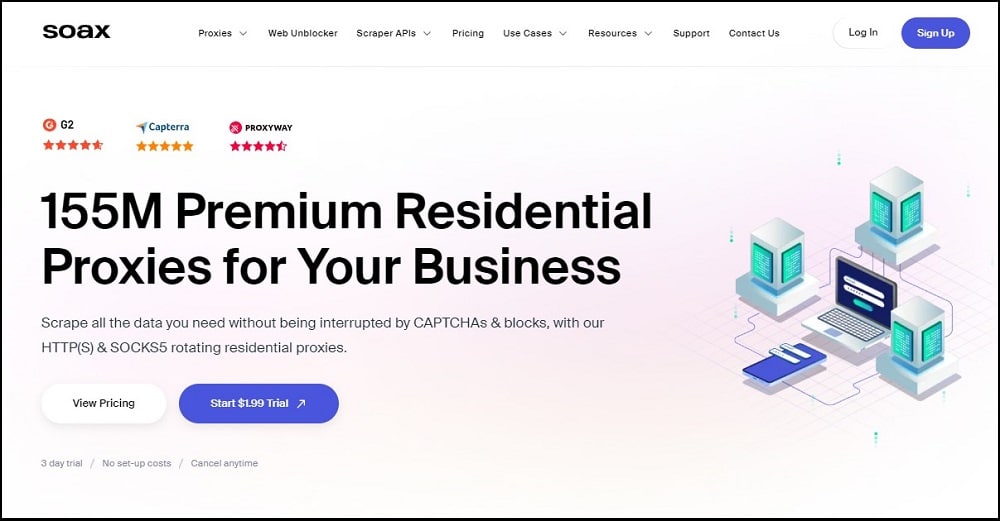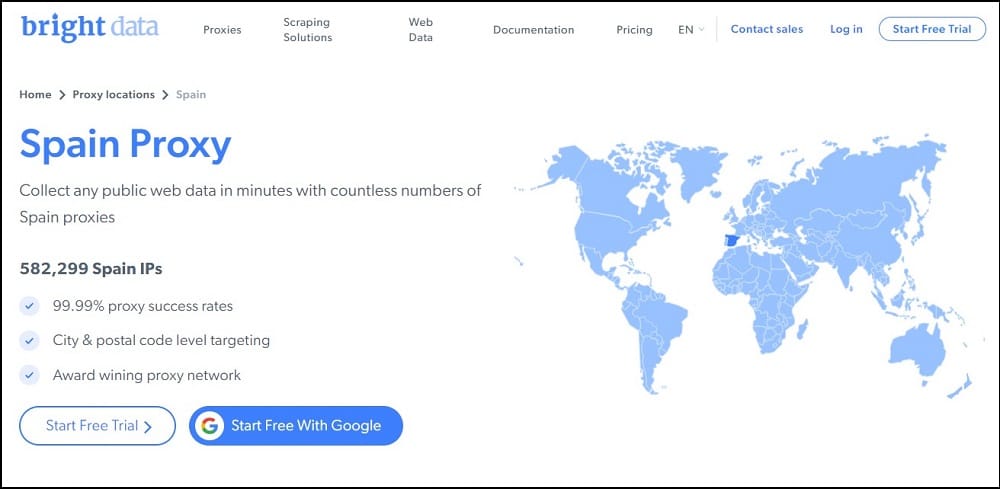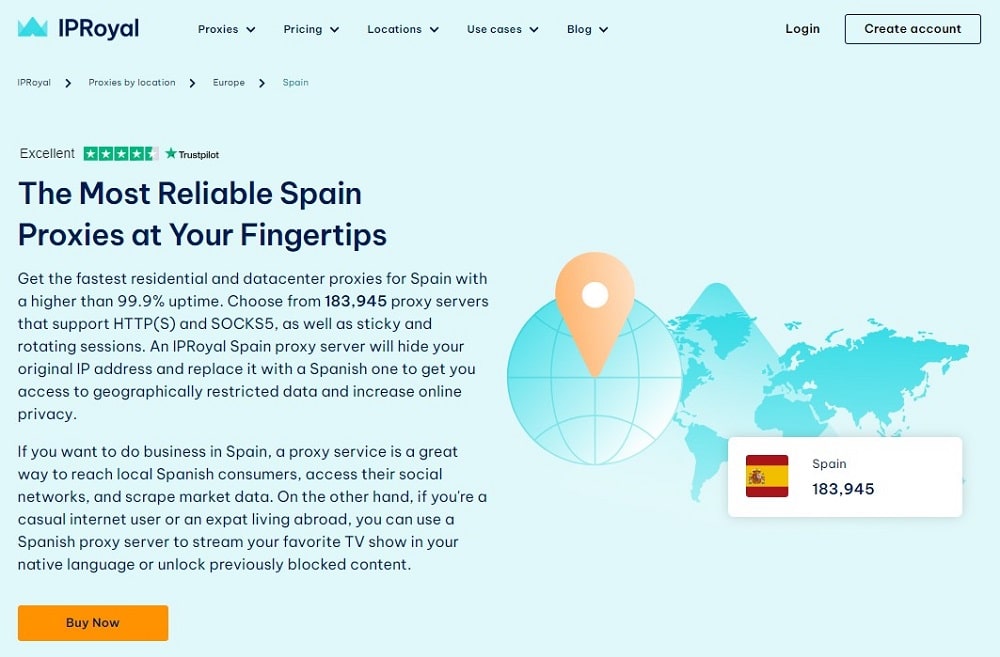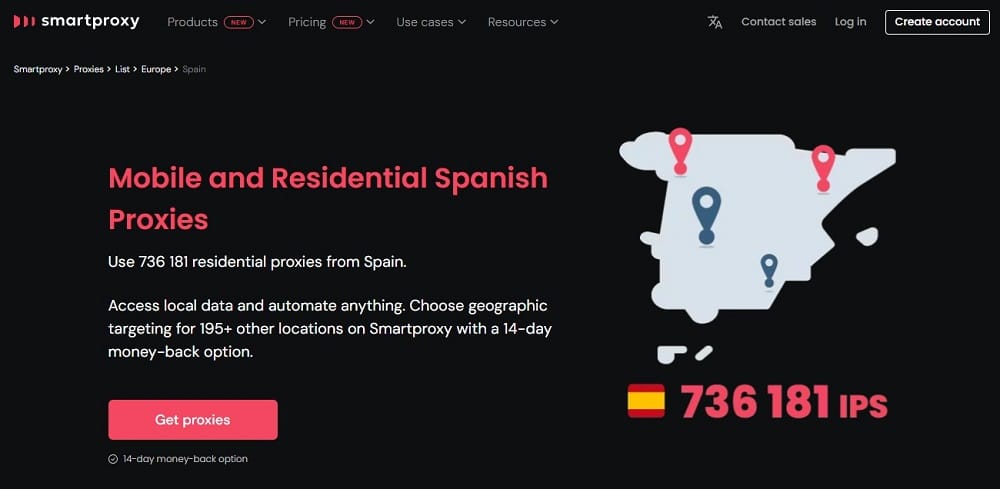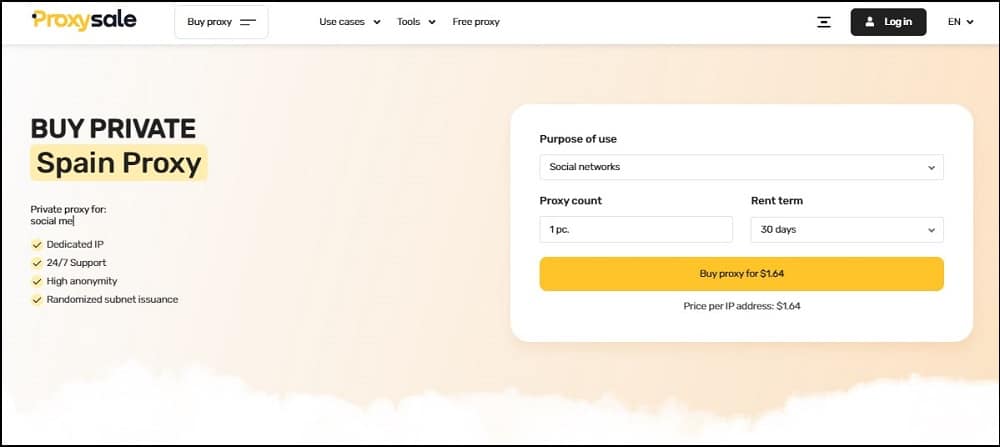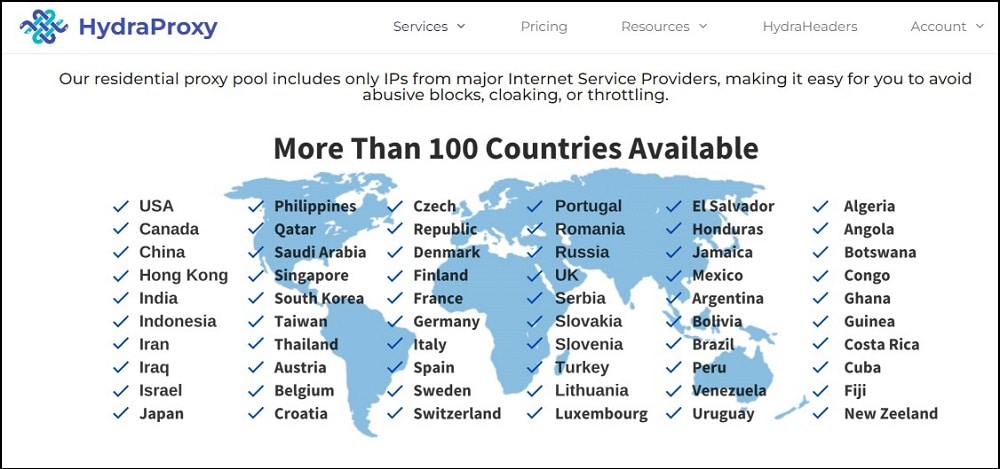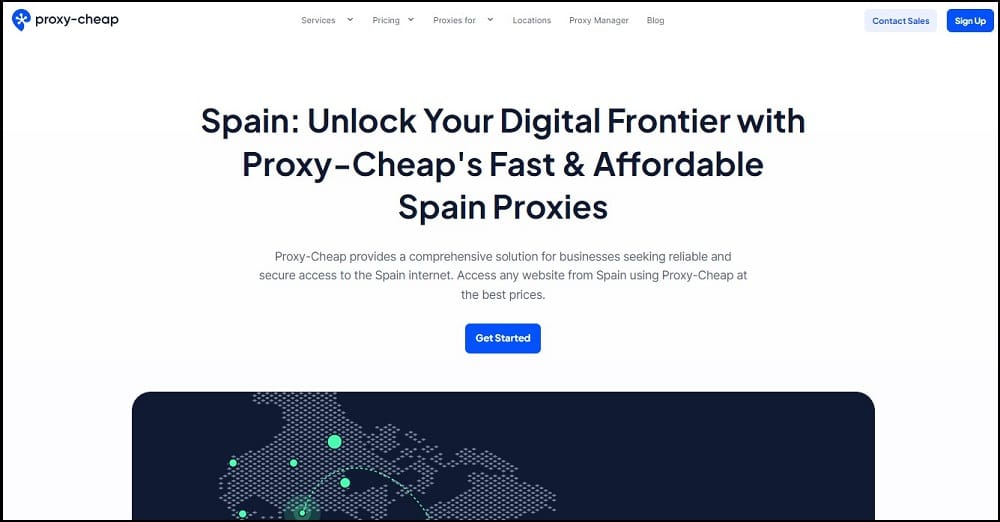Living in a world dominated by proxies means we need to get them from good providers. There are use cases where you’ll need IP addresses from certain countries, which is where lists like these come into play. Today, we’ll discuss the best providers to get proxies from Spain.

There are tons of advantages of living in a modern era like today. We get access to tons of services designed to make our lives easier. Some of them help us with business-related projects, while others are used for entertainment. On the other hand, there are those that cover both sides.
Among the many services you’ll find that can help in personal or enterprise use cases are proxies. They help us bypass restrictions, remain anonymous, and do all kinds of things we won’t be able to do without them.
Getting proxies from most prominent providers is enough to get something done in many situations. With that said, there are situations where you need something a bit more specific, and we’re not talking about certain types of proxies.
Some projects or applications require you to aim for IP addresses from a certain location. As a result, you’ll need to be mindful of where you get the proxies from because not all providers have IP addresses in every country in the world.
For today’s list, we’ll be covering a country in Europe. To be specific, we’ll outline the best proxy providers if you need IP addresses from Spain.
Table of Contents
Free ES Proxy Lists
- https://www.proxynova.com/proxy-server-list/country-es/
- https://spys.one/free-proxy-list/ES/
- https://www.freeproxy.world/?country=ES
- https://hidemy.io/en/proxy-list/countries/spain/
- https://www.proxydocker.com/en/proxylist/country/Spain
More free proxy lists Here.
Paid ES Proxies
Our first pick may not be the most popular on this list, but that doesn’t make it a bad performer. Proxy-Seller is a provider that offers all kinds of proxies, and you can get IP addresses from Spain with all of them.
On the datacenter side of things, you have the IPv4 and IPv6 made to offer the highest speeds and lowest latency possible. This is thanks to the gigabit speeds of the servers, meaning that you’ll get better performance when compared with some of the other types of proxies. Proxy-Seller has no mention of the size of the pool, but with over 400 networks and 800 subnets, you can be sure that there are plenty of Spanish proxies.
Unlike some of its rivals, with this one, you have the flexibility to choose which protocol you’ll be using. Another flexible side of this provider is the pricing. You can choose the package duration to be anywhere between 1 week and 12 months and choose as many IP addresses as you need. The only difference is that with the IPv6, the minimum you can get is 10 proxies, while with the IPv4, only 1.
Next up, we have the ISP proxies. These are a form of residential proxies, but Proxy-Seller gets them directly from the provider. As a result, they offer the best of both worlds, combining the positive sides of residential and datacenter IP addresses. Similar to the datacenter proxies, you have very flexible features. You can choose between using HTTP or SOCKS protocols.
In addition to that, you can choose which authentication method you want to use – IP whitelist or username/password. The pricing structure is similar to the previous type. You can choose a rental period ranging from 1 week to 12 months and get as little as 1 IP address, meaning that these proxies have unlimited bandwidth.
The residential proxies are the next type that offers IP addresses from Spain. These are the most common option with any provider because they cover many use cases. The ones you can get from Proxy-Seller are rotating, and the service allows you to tweak the rotation rules or use a sticky session. The flexibility of the previous proxies is available with the residential ones.
You can fine-tune the geo-targeting and get Spanish proxies from certain cities or providers, and you can also choose which authentication method you want to use. Since the proxies come with limited bandwidth, the packages vary depending on how much traffic they come with. The provider offers the option to get a custom package, or you can go with the pre-paid one, depending on your needs.
Finally, we have the mobile proxies, and even though there are two types, if you’re after Spanish IP addresses, you’ll need to go for the dedicated ones. Unlike many of its rivals, these come with unlimited bandwidth, meaning you’ll purchase by the number of proxies. The proxies are 4G, meaning that you’re looking at speeds of up to 30 Mbit/s, which is pretty decent.
In terms of rotations, you can choose to have them rotate at a certain interval or with each link request. The pricing structure is per IP, and similar to the other types, you can choose a duration from 1 week to 12 months. During the signup process, you can also choose between two providers available in Spain.
We’re continuing this list with another provider that isn’t on the top of the popularity scale. Proxy-IPv4 also offers many products, all of which have IP addresses in Spain.
Similar to the previous provider, Proxy-IPv4 has datacenter proxies in both flavors – IPv4 and IPv6. Like many of its rivals, Proxy-IPv4 doesn’t mention the exact size of the pool, but considering the number of networks and subnets, we believe that it offers a lot. As datacenter proxies, you’re looking at excellent speeds and low latency, which is ideal for high-traffic projects.
The pricing structure is similar, with a few minor differences. With the IPv4 datacenter proxies, you have excellent flexibility with the lease term, allowing you to go from 3 to 90 days and get as little as 1 IP address. For the IPv6 proxies, you can choose between 30, 60, and 90 days for the lease term, and the smallest package comes with 10 IP addresses.
Proxy-IPv4 also offers ISP proxies. At their core, they are residential proxies, but instead of getting them from users, companies get them from internet providers. The speeds of these proxies are better than the residential ones, which is why they’re becoming popular.
With these proxies, you have pretty good flexibility regarding supported protocols, meaning that depending on your project, you can use HTTP or SOCKS. You can also choose between two types of authentication. The pricing structure is identical to the IPv4 proxies. You can set the lease term to be as short as 3 days and take it up to 90 days, and the smallest package can be purchased with 1 IP address.
Last but not least are the mobile proxies. In many ways, these are similar to the residential ones, but instead of getting sourced from computers, these are from mobile devices. You won’t have gigabit speeds, but Proxy-IPv4 claims you should get up to 30 Mbps. This provider offers the option to tweak the rotating rules, and you can get a new IP address with every request at a certain interval or have them change by setting the rules through a script.
Some people may feel limited by only one authorization option, but on the other hand, you have multiple supported protocols, so the use-case flexibility isn’t compromised. In terms of the pricing structure, you have multiple options for the lease term, and you can get as little as 1 IP address. Unfortunately, when it comes to choosing a provider, you only have one option.
For our next proxy provider, we’re going with a more popular one. Soax is a company that has a pretty big pool and a wide range of products, most of which offer proxies in Spain.
Residential proxies are the most popular ones, so we’re starting with those. The pool of proxies consists of almost 800,000, which cover multiple types of IP addresses, but we’re positive that most are residential ones. The set of features ticks all the right boxes, which is why this provider is so popular.
You can set the rotation rules to automatic, which should help a lot in terms of letting your project run on autopilot. This provider also offers a choice regarding protocols, offering you the option to choose between HTTP and SOCKS.
The next type of proxies you can get from Soax are the mobile ones. There are many similarities with the previous type, and the difference is that these are sourced from mobile devices. Considering the similarities in the type, you’re also looking at a similar set of features.
These Spanish proxies are rotating, and this provider allows you to tweak the rotation settings based on your needs. The pool is a mix of 3G, 4G, and 5G proxies, so the speeds will vary. Also, you have the option to choose between multiple protocols.
Finally, we have the datacenter proxies, the ones you’d want if you need the highest speeds possible. This is thanks to the gigabit connections of the servers where the proxies are from, making them an excellent choice for high-traffic projects. Like the previous types of proxies, you have plenty of flexibility, especially in choosing which protocol you want to use. The biggest drawback with these proxies is that they don’t come with unlimited bandwidth like many of its rivals.
Since all 3 types of proxies are limited by the amount of bandwidth, the pricing structure is identical. There are multiple packages to choose from, with the residential and mobile proxies having more than the datacenter ones.
It means you get access to the entire pool of Spanish IP addresses and are paying per GB. Going for the larger packages means that you’re paying less. Also, there is an option to test Soax’s services, but it comes as a trial that will cost you $1.99 for a 3-day package.
We come to a provider that’s one of the best in the industry. Bright Data is one of the most popular providers in this niche, offering multiple types of proxies from Spain.
The most common types of proxies people get from Bright Data are the rotating residential ones. There’s a massive pool, and for Spain, you’re looking at over 400,000 IP addresses, which is quite a lot. Having this many proxies means that you get access to an advanced geo-targeting feature. As a result, you can get IP addresses from specific cities, zip codes, or providers. You can also fine-tune the rotation settings and keep a session as long or as short as needed.
A similar type of Spanish proxy you can get from Bright Data is the ISP one. Considering that these come straight from the providers means that the performance is a bit better. With these, you’re looking at a pool of over 12,000, which is pretty good, considering the type. Even though it seems like the pool is small, you still have the option to target specific cities in Spain. The flexibility continues in terms of your options for the session, as well as the supported protocols.
The datacenter is another type of Spanish proxy you can get from Bright Data. The pool has almost 23,000 IP addresses, meaning there’s more than enough even for larger projects. Since these come from servers, you won’t have massive flexibility in choosing specific cities or zip codes. Another aspect that we’re not massive fans of is the pricing.
Unlike many datacenter providers, with this one, the bandwidth is limited, and you’re also paying for every IP you need. On a positive note, you’re looking at one of the best performing datacenter proxies in the world.
The last type we’ll talk about is the mobile proxies. These are similar to the residential IP addresses, and with over 81,000 Spanish proxies, you have a lot to choose from. Thanks to the pool’s size, you can get proxies from specific providers if needed. As for the proxies, like with the previous provider, you have a mix of 3G, 4G, and 5G proxies. You can control the session rules and set them to rotate at the interval you need, and you can also choose between multiple protocols.
The pricing structure is the same despite discussing different types of proxies. There are 3 tiers to choose from, varying depending on the bandwidth you need. For larger projects, Bright Data allows you to ask for a custom package tailored to your needs.
In addition to that, you can also go for the pay-as-you-go package and get as much bandwidth as you need without a monthly commitment. The best part about this provider is that it offers a free trial package with all proxy types.
Next on our list is a provider that may not be on the same level as the previous one, but it’s still an excellent performer. With IPRoyal, you have multiple types of Spanish proxies to choose from, meaning there is some flexibility.
The residential ones are the most popular choice, so we’re starting with those. IPRoyal claims to have over 180,000 Spanish proxies, and the majority of those are residential ones. This gives you the option to get IP addresses from certain cities.
Another flexible side of this provider is that you can play with the rotation rules and have a new proxy whenever you need to or keep a session sticky. The best part is that there’s no monthly commitment, and the traffic never expires. As a result, you can get anywhere between 1 and 5,000 GB and use them for as long as you need to. You can also ask for a custom package if you need more than that.
Next on the list from IPRoyal are the private proxies. These are technically residential proxies. As a result, they’re a good option for projects where you need a certain number of proxies. It means you’re paying by IP address, so there’s no limit on the bandwidth or the session.
You also have excellent flexibility in terms of the supported protocols, being able to use HTTP or SOCKS, depending on your needs. The pricing structure is simple. There are 3 packages for 1 proxy, and they differ in duration, ranging from 30 to 90 days, with the rest of the features being identical.
You may think that the static residential proxies are similar to the previous ones, and you’re partially right. While these are residential proxies, they come directly from providers, offering better performance. These are also dedicated proxies, so as long as you’re paying for them, you’ll be the only one who uses them.
The best part about the static proxies is that they have unlimited bandwidth. As a result, the pricing structure is based on the duration of the package. You can get a single Spanish IP address for only 1 day and take that up to 90 days. For more than that, you can talk to the sales department to get a quote.
Finally, we have the datacenter Spanish proxies. These are the types of proxies you’d get if you want access to IP addresses with high speeds and low latency. They work well with websites or services that don’t prohibit the use of proxies. Unlike some of the other datacenter proxies on this list, these only come as a dedicated option, meaning you’ll be the only one using them.
Since they come with unlimited bandwidth, the packages are structured based on the duration of the package. You can choose between 30, 60, and 90 days and get as little as 1 IP address.
We often say that Smartproxy is one of the best options on the market, and considering that it offers proxies from Spain, we had to include it on this list.
Like many providers here, the most popular proxies are the residential ones, so we’re starting with those. You have a massive pool of Spanish IP addresses, meaning you can rely on the advanced geo-targeting feature this provider offers. As a result, you can choose your IP to be from a certain city.
You can also set the rotation rules as needed and go with a rotating or a sticky one. There is flexibility in terms of the protocol, meaning you can choose between HTTP or SOCKS. The pricing structure is set up based on the amount of bandwidth. You have 5 available packages and the option to go for the pre-paid one.
A similar type of proxies are the mobile ones. You won’t have many Spanish IP addresses to play with, but that doesn’t mean you’re getting fewer features. You still have the advanced geo-targeting feature and can fine-tune your search to get the best proxies for your needs. As a bonus, you can also filter by OS and choose proxies from iOS or Android devices. Like before, you can choose between two protocols – HTTP and SOCKS.
The pool consists of proxies with various speeds, ranging from 3G to 5G, so you are looking at some variance there. The pricing structure is similar to the previous type. There are several pre-made packages, which vary depending on the amount of included bandwidth, along with the option to get the pay-as-you-go one.
The last type of Spanish proxies you can get from Smartproxy is the datacenter ones. There are two types here – shared and dedicated, but the dedicated ones are only from the US, so you’ll have only the shared ones. These come in two variants, depending on your project. You can pay per GB or per IP address, so there’s a lot of flexibility here.
As for the features, you’re looking at proxies that only support HTTP protocol. On the positive side, you can tweak the rotation options as you need to and even go for a sticky session. Depending on which type you choose, you have multiple packages to choose from, all of which come with the same set of features.
For our next pick, we’re going for a slightly lesser-known provider. Proxy-sale is one of those options some people may pass, which is a shame because it’s an excellent option with multiple types of Spanish proxies.
The first type we’ll talk about is the datacenter proxies. Proxy-sale has IPv4 and IPv6, but if you’re after IP addresses from Spain, your only option is the IPv4 proxies. These are from servers with gigabit connections, meaning the performance won’t be an issue. You have support for multiple protocols, so the flexibility isn’t compromised.
Also, the service allows you to choose which authentication method you’ll use, which is an excellent advantage over some of its rivals. Even though the pool isn’t the largest in the world, you can still get proxies from certain cities.
Next, we have the ISP Spanish proxies, which seem similar to the datacenter ones. In essence, they are, with the main difference being that these are IP addresses that providers assign to users. As for the rest of the features, they are quite similar. You have excellent flexibility in terms of the protocols or the type of authentication.
The geo-targeting feature is also available here, allowing you to get IP addresses from specific cities, but keep in mind that not all of them are available. Like before, these are static proxies, meaning you’ll be using the same IP address for as long as you pay.
Another type of Spanish IP address that Proxy-sale has to offer is the mobile proxies. They work similarly to the residential ones, but providers source them from mobile users. The pool consists of multiple types of mobile proxies, so the speeds will vary, but the provider claims that you’ll be getting speeds of up to 50 Mbps.
These are dynamic IP addresses, meaning that you can fine-tune the rotation rules based on time or with each link. Like the previous types, you can choose between IP whitelist or username/password authentication.
The pricing structure for these 3 types of Spanish proxies is similar. Once you choose Spain as the location, you set the number of proxies you want to get, starting with 1 IP address. The duration of the packages ranges from 7 to 360 days with all 3 types. For the mobile proxies, you can get a 2-day package, which is excellent for short projects.
Finally, we have the residential Spanish proxies. These proxies come from home or office users, meaning they are aimed at projects where you need the best anonymity. Proxy-sale offers a decently sized pool of proxies, allowing you to utilize the geo-targeting feature where you can get IP addresses from certain cities or providers. Another flexible side is the rotation, where you can tweak the duration of each proxy or keep a session sticky.
Also, you have an option to choose between two types of authentication. The pricing structure is similar to most of its rivals. You can choose the amount of bandwidth you need each month or get the pay-as-you-go package if you want to avoid the monthly commitment. There’s also the option for a custom package if you have a larger project.
Our next Spanish proxy provider doesn’t offer as many types of IP addresses as the rest, but it’s still an excellent option. HydraProxy is a provider to consider if you’re after residential and mobile proxies.
On the residential side of things, we have more or less similar features to those of many of its rivals. These Spanish proxies are rotating, meaning you can play around with those settings and keep a session sticky or rotate it as needed. In terms of the protocols, this one only supports HTTP. As for the rotation options, you can tweak them and choose if you want to use a sticky session or rotate things as you need to.
Unlike many of its rivals, HydraProxy has no monthly commitment. As a result, you’re getting as much bandwidth as you need and use it for as long as you need. There are 3 tiers based on the amount of traffic you’ll get with the option to go for a custom one.
The second type of Spanish proxies you can get from Hydraproxy are the static mobile ones. These are a combination of 4G and Wi-Fi IP addresses from mobile devices. Even though this provider doesn’t have a massive pool, the option to target proxies from certain providers, cities, or Zip codes is available.
One thing we like is the unlimited bandwidth, which isn’t a common sight with these kinds of proxies. As a result, the pricing structure is simple. You pay based on the number of proxies and days you need, starting with 1 port for 1 day.
On the more affordable side of things, we have Proxy-Cheap. Despite the lower price than some competitors, this provider offers excellent services, including multiple types of proxies from Spain.
Proxy-Cheap offers both types of datacenter proxies, but if you need IP addresses from Spain, you’ll have to settle for the IPv4 ones. Despite that, you’re getting all the necessary features that these kinds of proxies offer. You get excellent speeds of up to 100 Mbps, which is excellent for high-traffic scenarios. With that, you also get up to 100 concurrent streams to keep your projects running smoothly.
On the residential side of things, Proxy-Cheap has two types, with the first being the static proxies. Even though these are a combination of datacenter and residential proxies, they still perform like residential ones. As a result, you’re looking at Spanish proxies with excellent performance, capable of delivering speeds of up to 100 Mbps. All of this means that you can rely on these proxies for a CAPTCHA-free experience and a project that will run smoothly without any interference.
Regarding the pricing structure, you have 3 options varying depending on the duration for both types of proxies above. You can get proxies for 1 day, 1 week, or 1 month, with the option of getting a discount for yearly billing cycles.
The last type of proxies you can get from Proxy-Cheap are the residential ones. These are identical to most of the ones we covered so far, meaning that they are rotating, and the Spanish IP addresses come from real users. This provider doesn’t have a massive pool of residential proxies, but they are enough for what most people need, even if we’re talking about larger projects.
To keep things running smoothly, you’re looking at IP addresses with unlimited concurrency, which should also help you with efficiency. Like most rotating residential proxies, you’re looking at packages with limited bandwidth. There are 3 options to choose from, depending on the amount of traffic you plan on using each month, meaning that you’re paying per GB. If you’re going for larger packages, you’re looking at a bigger discount.
Our last pick is a dedicated provider that we often mention here. MPP deals with datacenter proxies, and in this case, you can rely on it to get Spanish IP addresses. Since we’re talking about a datacenter proxy provider, you don’t have a lot of flexibility regarding the type of proxies. That said, you can get two types of IP addresses – shared and dedicated.
As you can guess, the shared ones are the type of IP addresses that multiple users will use, and if you want to have exclusive usage rights over the proxies, you’ll need to get the dedicated ones. In terms of the locations and the pool, there’s only one datacenter with a little over 2,000 Spanish proxies. It’s not a lot, but it should be fine for most use cases.
Since we’re talking about datacenter proxies, you’re looking at unlimited bandwidth on both types. As a result, you’ll be paying based on the number of IP addresses you’ll be getting. The shared proxies come in bundles, with the smallest one counting 50 IP addresses, while the dedicated ones offer the option to get a package with only 1 IP address.
In terms of the rest of the features, they are identical across all packages, so it doesn’t matter if you go for the smallest or the largest packages; you’re still getting the same. For both types of proxies, you’re looking at an option to ask for a custom package with more proxies than the ones in the largest package offered by MPP.
